BMG312 WOU - IHRM: Expatriate Training, Culture & Global Success
VerifiedAdded on 2023/06/18
|8
|2495
|434
Essay
AI Summary
This essay delves into the critical aspects of International Human Resource Management (IHRM), emphasizing the strategic importance of cross-cultural awareness for expatriate managers in multinational corporations and the design and effectiveness of pre-departure training programs. It highlights how cultural understanding and targeted training contribute to the global success of firms like Intel, which operates in diverse national contexts such as Malaysia. The essay discusses key components of cross-cultural awareness, including host country information, cultural profiles, variances, and biases, as well as communication techniques and business etiquettes. Furthermore, it analyzes the benefits of well-designed expatriate training programs, such as optimal resource utilization, improved performance, employee well-being, language proficiency, seamless integration, and in-country coaching. The analysis underscores the necessity of IHRM for firms of all sizes to ensure smooth operations and profitability in foreign markets while maintaining a positive global image. This assignment is available on Desklib, a platform that provides a range of AI-based study tools and solved assignments for students.
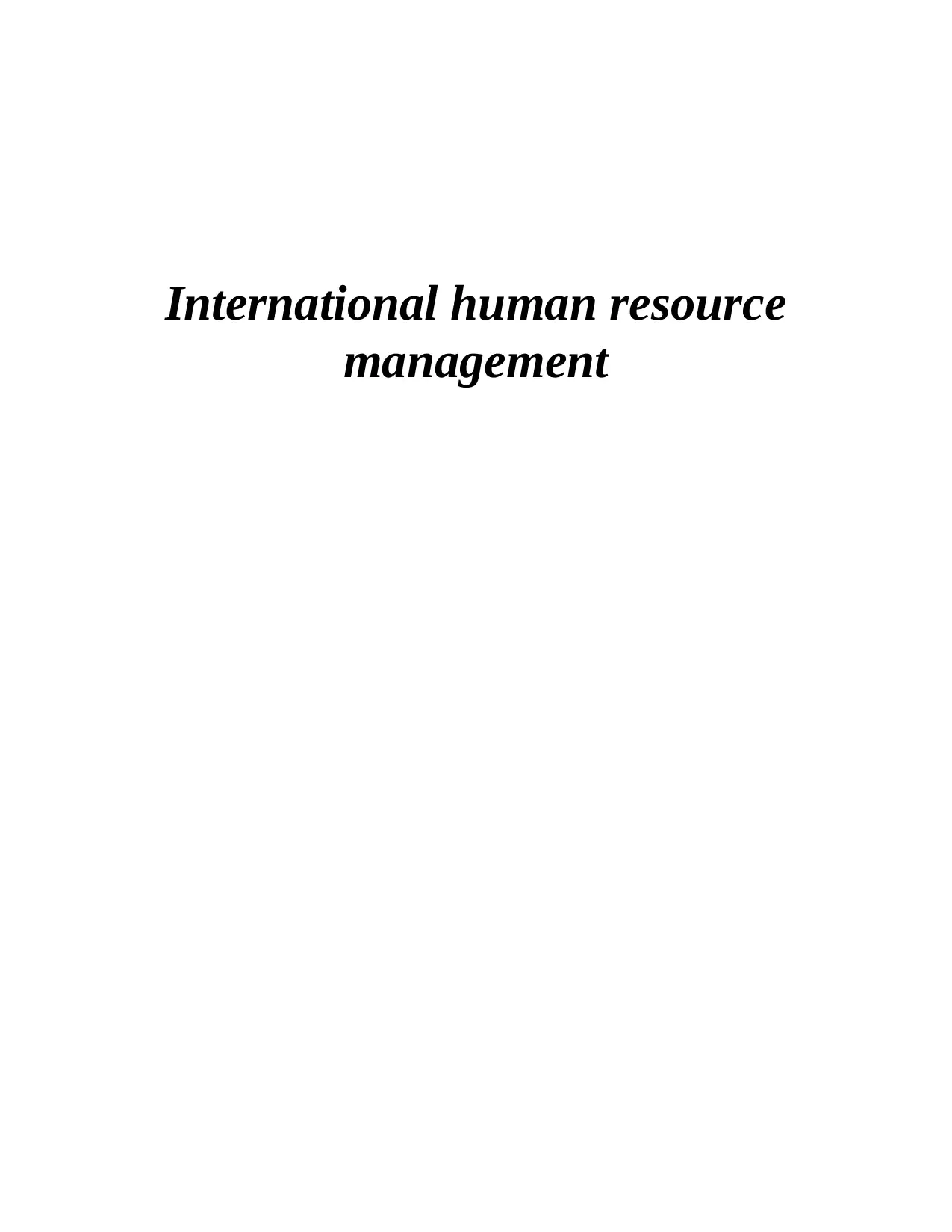
International human resource
management
management
Paraphrase This Document
Need a fresh take? Get an instant paraphrase of this document with our AI Paraphraser
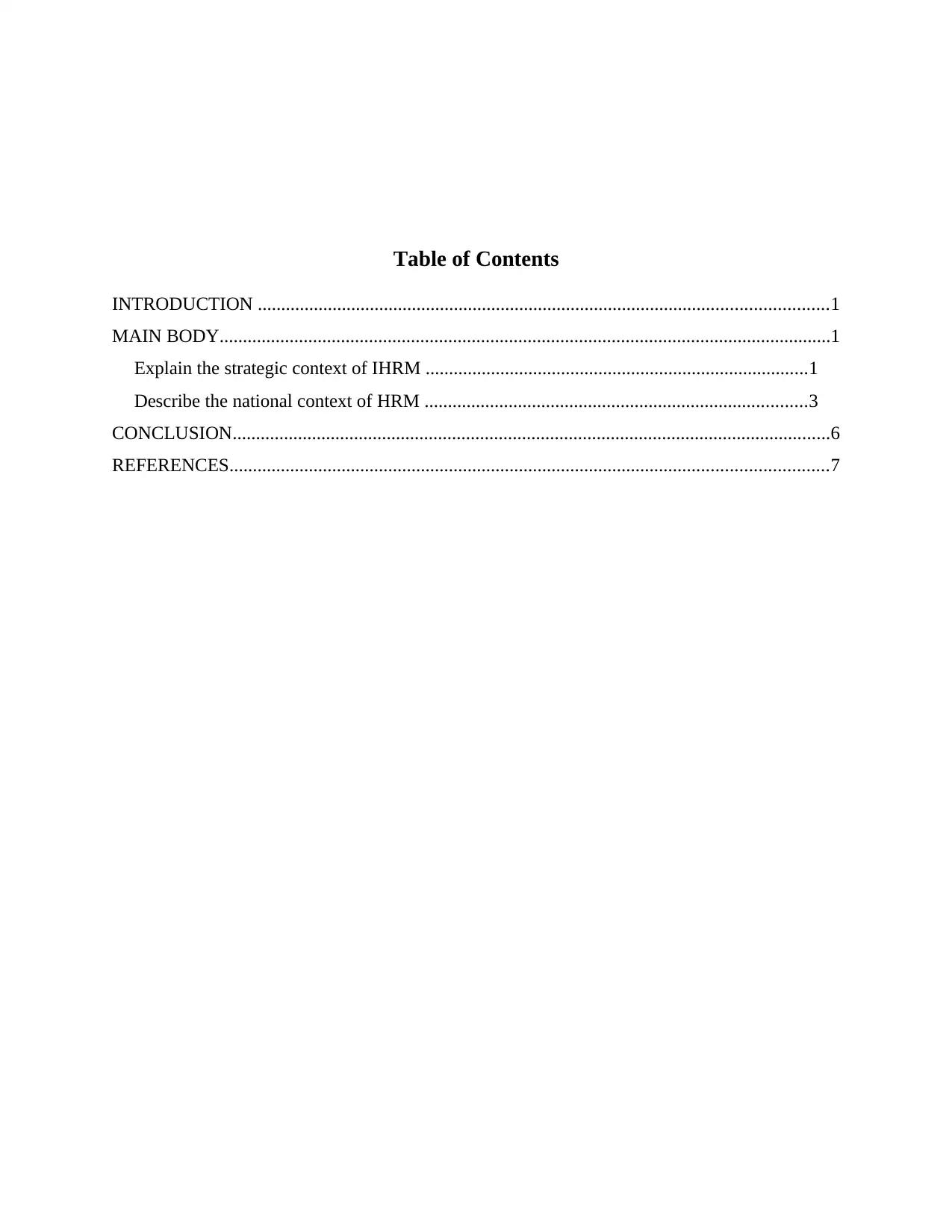
Table of Contents
INTRODUCTION ..........................................................................................................................1
MAIN BODY...................................................................................................................................1
Explain the strategic context of IHRM ..................................................................................1
Describe the national context of HRM ..................................................................................3
CONCLUSION................................................................................................................................6
REFERENCES................................................................................................................................7
INTRODUCTION ..........................................................................................................................1
MAIN BODY...................................................................................................................................1
Explain the strategic context of IHRM ..................................................................................1
Describe the national context of HRM ..................................................................................3
CONCLUSION................................................................................................................................6
REFERENCES................................................................................................................................7
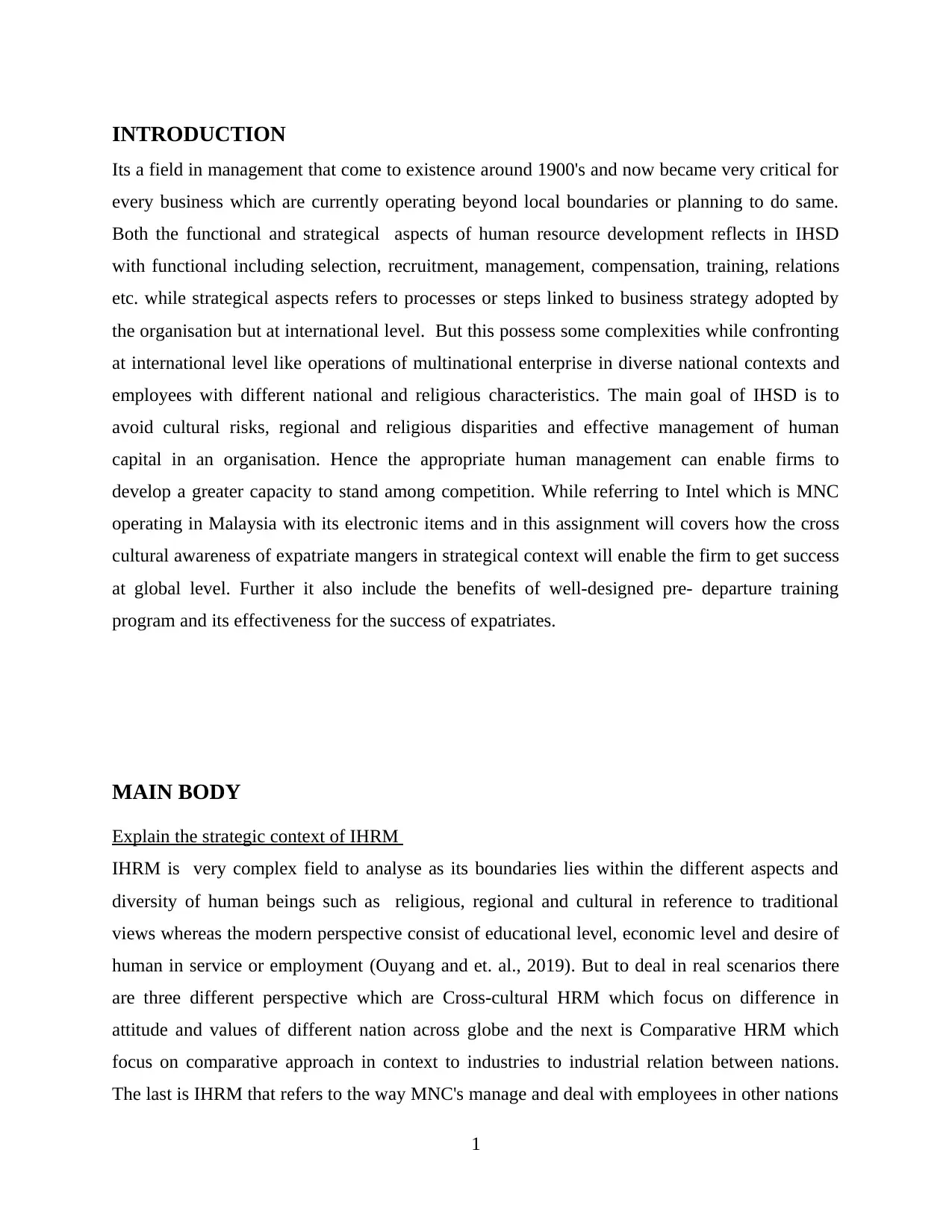
INTRODUCTION
Its a field in management that come to existence around 1900's and now became very critical for
every business which are currently operating beyond local boundaries or planning to do same.
Both the functional and strategical aspects of human resource development reflects in IHSD
with functional including selection, recruitment, management, compensation, training, relations
etc. while strategical aspects refers to processes or steps linked to business strategy adopted by
the organisation but at international level. But this possess some complexities while confronting
at international level like operations of multinational enterprise in diverse national contexts and
employees with different national and religious characteristics. The main goal of IHSD is to
avoid cultural risks, regional and religious disparities and effective management of human
capital in an organisation. Hence the appropriate human management can enable firms to
develop a greater capacity to stand among competition. While referring to Intel which is MNC
operating in Malaysia with its electronic items and in this assignment will covers how the cross
cultural awareness of expatriate mangers in strategical context will enable the firm to get success
at global level. Further it also include the benefits of well-designed pre- departure training
program and its effectiveness for the success of expatriates.
MAIN BODY
Explain the strategic context of IHRM
IHRM is very complex field to analyse as its boundaries lies within the different aspects and
diversity of human beings such as religious, regional and cultural in reference to traditional
views whereas the modern perspective consist of educational level, economic level and desire of
human in service or employment (Ouyang and et. al., 2019). But to deal in real scenarios there
are three different perspective which are Cross-cultural HRM which focus on difference in
attitude and values of different nation across globe and the next is Comparative HRM which
focus on comparative approach in context to industries to industrial relation between nations.
The last is IHRM that refers to the way MNC's manage and deal with employees in other nations
1
Its a field in management that come to existence around 1900's and now became very critical for
every business which are currently operating beyond local boundaries or planning to do same.
Both the functional and strategical aspects of human resource development reflects in IHSD
with functional including selection, recruitment, management, compensation, training, relations
etc. while strategical aspects refers to processes or steps linked to business strategy adopted by
the organisation but at international level. But this possess some complexities while confronting
at international level like operations of multinational enterprise in diverse national contexts and
employees with different national and religious characteristics. The main goal of IHSD is to
avoid cultural risks, regional and religious disparities and effective management of human
capital in an organisation. Hence the appropriate human management can enable firms to
develop a greater capacity to stand among competition. While referring to Intel which is MNC
operating in Malaysia with its electronic items and in this assignment will covers how the cross
cultural awareness of expatriate mangers in strategical context will enable the firm to get success
at global level. Further it also include the benefits of well-designed pre- departure training
program and its effectiveness for the success of expatriates.
MAIN BODY
Explain the strategic context of IHRM
IHRM is very complex field to analyse as its boundaries lies within the different aspects and
diversity of human beings such as religious, regional and cultural in reference to traditional
views whereas the modern perspective consist of educational level, economic level and desire of
human in service or employment (Ouyang and et. al., 2019). But to deal in real scenarios there
are three different perspective which are Cross-cultural HRM which focus on difference in
attitude and values of different nation across globe and the next is Comparative HRM which
focus on comparative approach in context to industries to industrial relation between nations.
The last is IHRM that refers to the way MNC's manage and deal with employees in other nations
1
⊘ This is a preview!⊘
Do you want full access?
Subscribe today to unlock all pages.

Trusted by 1+ million students worldwide
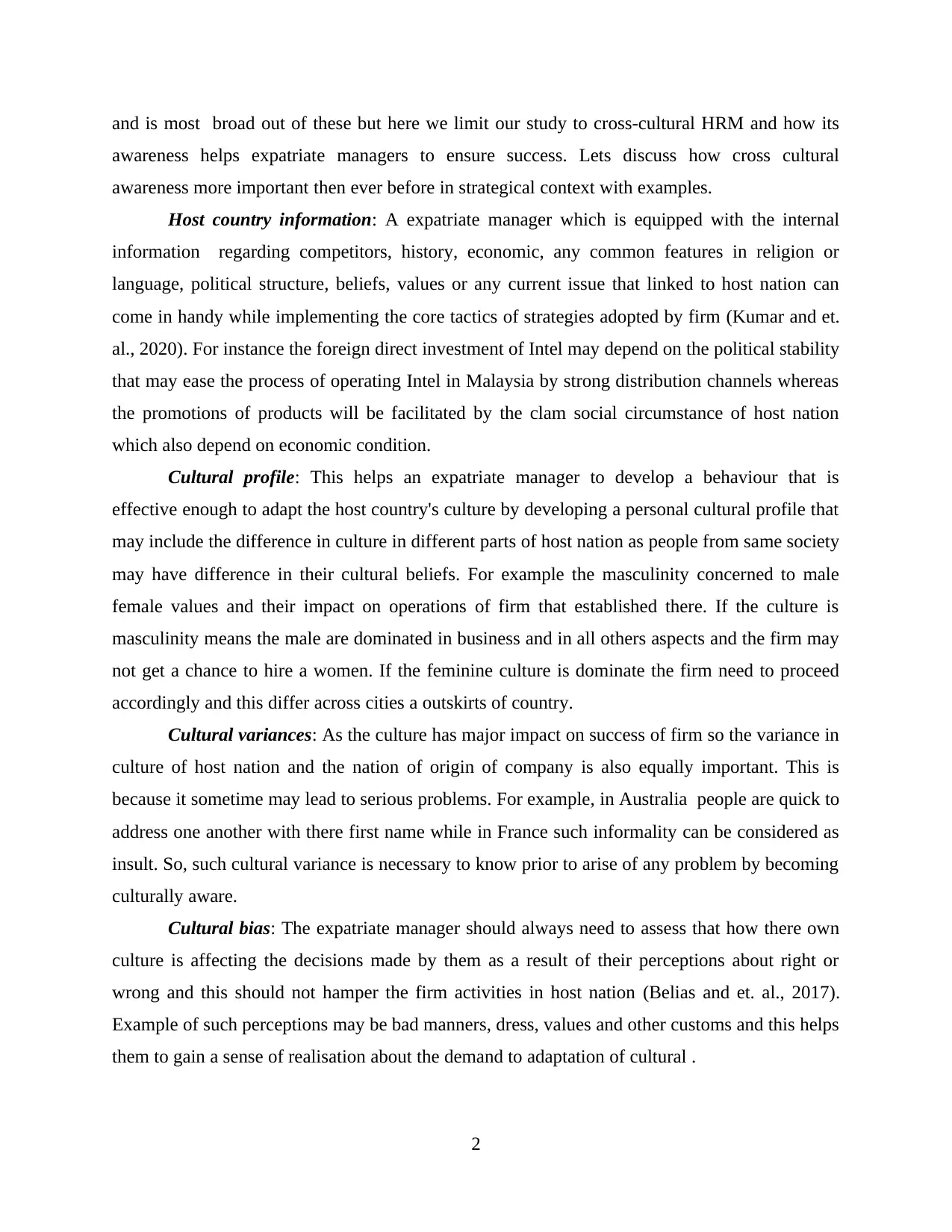
and is most broad out of these but here we limit our study to cross-cultural HRM and how its
awareness helps expatriate managers to ensure success. Lets discuss how cross cultural
awareness more important then ever before in strategical context with examples.
Host country information: A expatriate manager which is equipped with the internal
information regarding competitors, history, economic, any common features in religion or
language, political structure, beliefs, values or any current issue that linked to host nation can
come in handy while implementing the core tactics of strategies adopted by firm (Kumar and et.
al., 2020). For instance the foreign direct investment of Intel may depend on the political stability
that may ease the process of operating Intel in Malaysia by strong distribution channels whereas
the promotions of products will be facilitated by the clam social circumstance of host nation
which also depend on economic condition.
Cultural profile: This helps an expatriate manager to develop a behaviour that is
effective enough to adapt the host country's culture by developing a personal cultural profile that
may include the difference in culture in different parts of host nation as people from same society
may have difference in their cultural beliefs. For example the masculinity concerned to male
female values and their impact on operations of firm that established there. If the culture is
masculinity means the male are dominated in business and in all others aspects and the firm may
not get a chance to hire a women. If the feminine culture is dominate the firm need to proceed
accordingly and this differ across cities a outskirts of country.
Cultural variances: As the culture has major impact on success of firm so the variance in
culture of host nation and the nation of origin of company is also equally important. This is
because it sometime may lead to serious problems. For example, in Australia people are quick to
address one another with there first name while in France such informality can be considered as
insult. So, such cultural variance is necessary to know prior to arise of any problem by becoming
culturally aware.
Cultural bias: The expatriate manager should always need to assess that how there own
culture is affecting the decisions made by them as a result of their perceptions about right or
wrong and this should not hamper the firm activities in host nation (Belias and et. al., 2017).
Example of such perceptions may be bad manners, dress, values and other customs and this helps
them to gain a sense of realisation about the demand to adaptation of cultural .
2
awareness helps expatriate managers to ensure success. Lets discuss how cross cultural
awareness more important then ever before in strategical context with examples.
Host country information: A expatriate manager which is equipped with the internal
information regarding competitors, history, economic, any common features in religion or
language, political structure, beliefs, values or any current issue that linked to host nation can
come in handy while implementing the core tactics of strategies adopted by firm (Kumar and et.
al., 2020). For instance the foreign direct investment of Intel may depend on the political stability
that may ease the process of operating Intel in Malaysia by strong distribution channels whereas
the promotions of products will be facilitated by the clam social circumstance of host nation
which also depend on economic condition.
Cultural profile: This helps an expatriate manager to develop a behaviour that is
effective enough to adapt the host country's culture by developing a personal cultural profile that
may include the difference in culture in different parts of host nation as people from same society
may have difference in their cultural beliefs. For example the masculinity concerned to male
female values and their impact on operations of firm that established there. If the culture is
masculinity means the male are dominated in business and in all others aspects and the firm may
not get a chance to hire a women. If the feminine culture is dominate the firm need to proceed
accordingly and this differ across cities a outskirts of country.
Cultural variances: As the culture has major impact on success of firm so the variance in
culture of host nation and the nation of origin of company is also equally important. This is
because it sometime may lead to serious problems. For example, in Australia people are quick to
address one another with there first name while in France such informality can be considered as
insult. So, such cultural variance is necessary to know prior to arise of any problem by becoming
culturally aware.
Cultural bias: The expatriate manager should always need to assess that how there own
culture is affecting the decisions made by them as a result of their perceptions about right or
wrong and this should not hamper the firm activities in host nation (Belias and et. al., 2017).
Example of such perceptions may be bad manners, dress, values and other customs and this helps
them to gain a sense of realisation about the demand to adaptation of cultural .
2
Paraphrase This Document
Need a fresh take? Get an instant paraphrase of this document with our AI Paraphraser
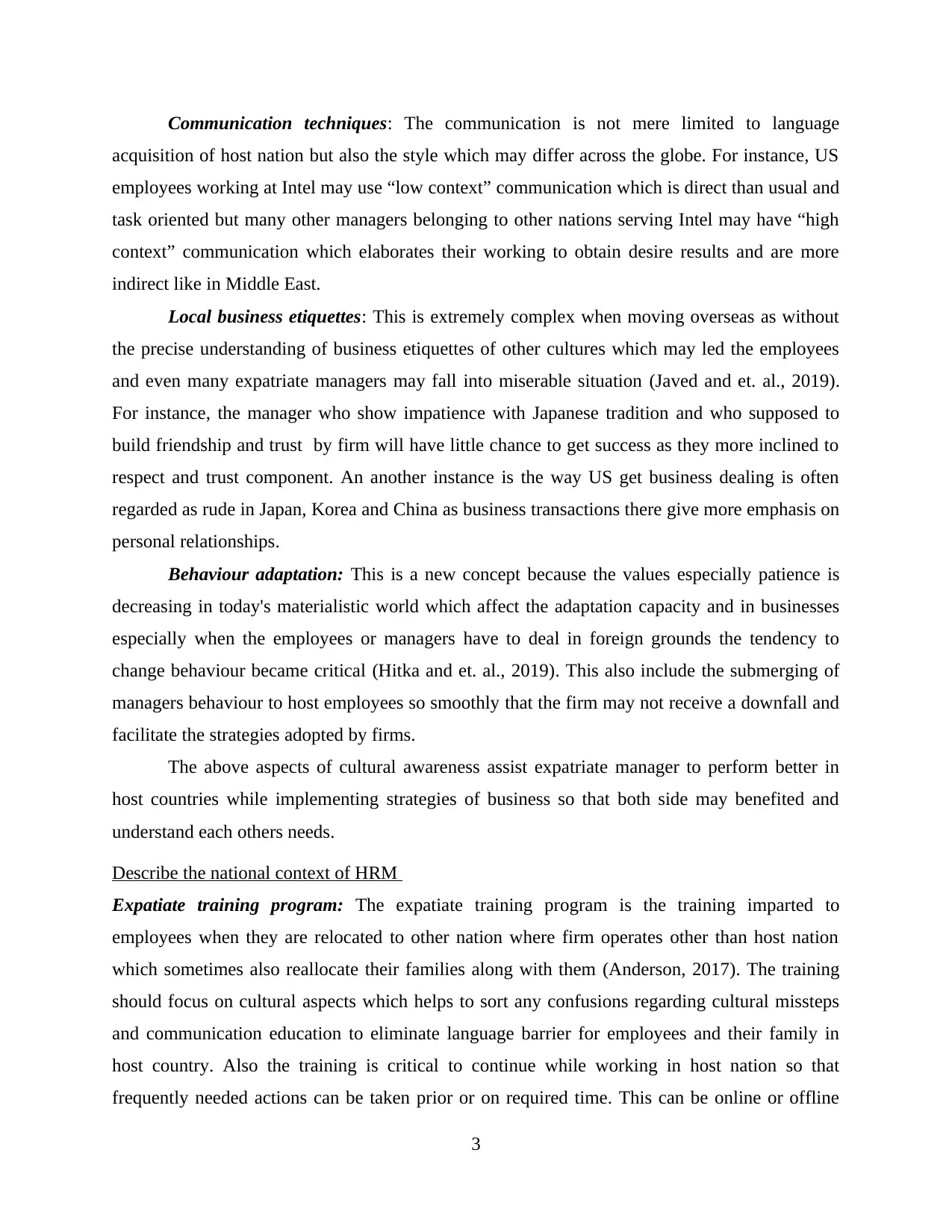
Communication techniques: The communication is not mere limited to language
acquisition of host nation but also the style which may differ across the globe. For instance, US
employees working at Intel may use “low context” communication which is direct than usual and
task oriented but many other managers belonging to other nations serving Intel may have “high
context” communication which elaborates their working to obtain desire results and are more
indirect like in Middle East.
Local business etiquettes: This is extremely complex when moving overseas as without
the precise understanding of business etiquettes of other cultures which may led the employees
and even many expatriate managers may fall into miserable situation (Javed and et. al., 2019).
For instance, the manager who show impatience with Japanese tradition and who supposed to
build friendship and trust by firm will have little chance to get success as they more inclined to
respect and trust component. An another instance is the way US get business dealing is often
regarded as rude in Japan, Korea and China as business transactions there give more emphasis on
personal relationships.
Behaviour adaptation: This is a new concept because the values especially patience is
decreasing in today's materialistic world which affect the adaptation capacity and in businesses
especially when the employees or managers have to deal in foreign grounds the tendency to
change behaviour became critical (Hitka and et. al., 2019). This also include the submerging of
managers behaviour to host employees so smoothly that the firm may not receive a downfall and
facilitate the strategies adopted by firms.
The above aspects of cultural awareness assist expatriate manager to perform better in
host countries while implementing strategies of business so that both side may benefited and
understand each others needs.
Describe the national context of HRM
Expatiate training program: The expatiate training program is the training imparted to
employees when they are relocated to other nation where firm operates other than host nation
which sometimes also reallocate their families along with them (Anderson, 2017). The training
should focus on cultural aspects which helps to sort any confusions regarding cultural missteps
and communication education to eliminate language barrier for employees and their family in
host country. Also the training is critical to continue while working in host nation so that
frequently needed actions can be taken prior or on required time. This can be online or offline
3
acquisition of host nation but also the style which may differ across the globe. For instance, US
employees working at Intel may use “low context” communication which is direct than usual and
task oriented but many other managers belonging to other nations serving Intel may have “high
context” communication which elaborates their working to obtain desire results and are more
indirect like in Middle East.
Local business etiquettes: This is extremely complex when moving overseas as without
the precise understanding of business etiquettes of other cultures which may led the employees
and even many expatriate managers may fall into miserable situation (Javed and et. al., 2019).
For instance, the manager who show impatience with Japanese tradition and who supposed to
build friendship and trust by firm will have little chance to get success as they more inclined to
respect and trust component. An another instance is the way US get business dealing is often
regarded as rude in Japan, Korea and China as business transactions there give more emphasis on
personal relationships.
Behaviour adaptation: This is a new concept because the values especially patience is
decreasing in today's materialistic world which affect the adaptation capacity and in businesses
especially when the employees or managers have to deal in foreign grounds the tendency to
change behaviour became critical (Hitka and et. al., 2019). This also include the submerging of
managers behaviour to host employees so smoothly that the firm may not receive a downfall and
facilitate the strategies adopted by firms.
The above aspects of cultural awareness assist expatriate manager to perform better in
host countries while implementing strategies of business so that both side may benefited and
understand each others needs.
Describe the national context of HRM
Expatiate training program: The expatiate training program is the training imparted to
employees when they are relocated to other nation where firm operates other than host nation
which sometimes also reallocate their families along with them (Anderson, 2017). The training
should focus on cultural aspects which helps to sort any confusions regarding cultural missteps
and communication education to eliminate language barrier for employees and their family in
host country. Also the training is critical to continue while working in host nation so that
frequently needed actions can be taken prior or on required time. This can be online or offline
3
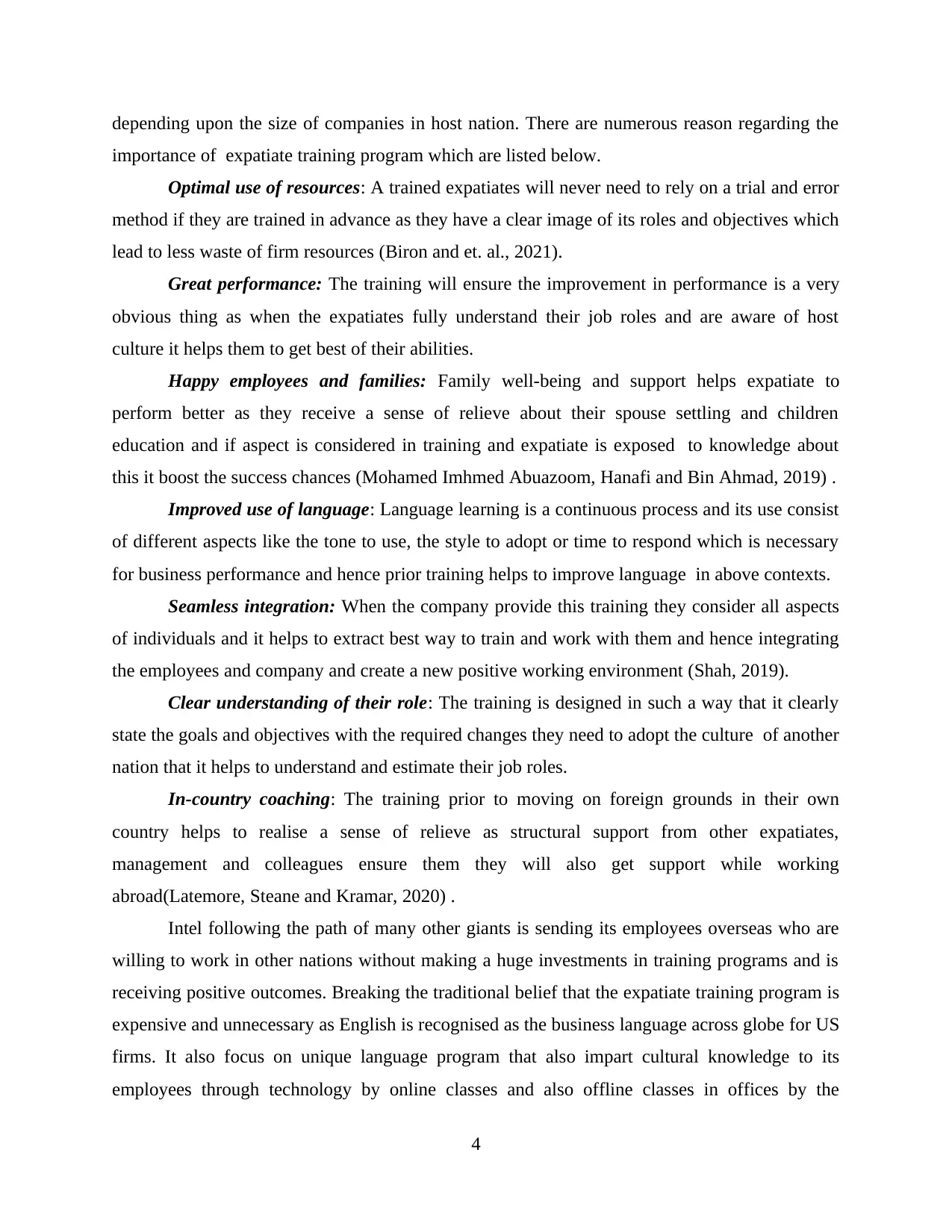
depending upon the size of companies in host nation. There are numerous reason regarding the
importance of expatiate training program which are listed below.
Optimal use of resources: A trained expatiates will never need to rely on a trial and error
method if they are trained in advance as they have a clear image of its roles and objectives which
lead to less waste of firm resources (Biron and et. al., 2021).
Great performance: The training will ensure the improvement in performance is a very
obvious thing as when the expatiates fully understand their job roles and are aware of host
culture it helps them to get best of their abilities.
Happy employees and families: Family well-being and support helps expatiate to
perform better as they receive a sense of relieve about their spouse settling and children
education and if aspect is considered in training and expatiate is exposed to knowledge about
this it boost the success chances (Mohamed Imhmed Abuazoom, Hanafi and Bin Ahmad, 2019) .
Improved use of language: Language learning is a continuous process and its use consist
of different aspects like the tone to use, the style to adopt or time to respond which is necessary
for business performance and hence prior training helps to improve language in above contexts.
Seamless integration: When the company provide this training they consider all aspects
of individuals and it helps to extract best way to train and work with them and hence integrating
the employees and company and create a new positive working environment (Shah, 2019).
Clear understanding of their role: The training is designed in such a way that it clearly
state the goals and objectives with the required changes they need to adopt the culture of another
nation that it helps to understand and estimate their job roles.
In-country coaching: The training prior to moving on foreign grounds in their own
country helps to realise a sense of relieve as structural support from other expatiates,
management and colleagues ensure them they will also get support while working
abroad(Latemore, Steane and Kramar, 2020) .
Intel following the path of many other giants is sending its employees overseas who are
willing to work in other nations without making a huge investments in training programs and is
receiving positive outcomes. Breaking the traditional belief that the expatiate training program is
expensive and unnecessary as English is recognised as the business language across globe for US
firms. It also focus on unique language program that also impart cultural knowledge to its
employees through technology by online classes and also offline classes in offices by the
4
importance of expatiate training program which are listed below.
Optimal use of resources: A trained expatiates will never need to rely on a trial and error
method if they are trained in advance as they have a clear image of its roles and objectives which
lead to less waste of firm resources (Biron and et. al., 2021).
Great performance: The training will ensure the improvement in performance is a very
obvious thing as when the expatiates fully understand their job roles and are aware of host
culture it helps them to get best of their abilities.
Happy employees and families: Family well-being and support helps expatiate to
perform better as they receive a sense of relieve about their spouse settling and children
education and if aspect is considered in training and expatiate is exposed to knowledge about
this it boost the success chances (Mohamed Imhmed Abuazoom, Hanafi and Bin Ahmad, 2019) .
Improved use of language: Language learning is a continuous process and its use consist
of different aspects like the tone to use, the style to adopt or time to respond which is necessary
for business performance and hence prior training helps to improve language in above contexts.
Seamless integration: When the company provide this training they consider all aspects
of individuals and it helps to extract best way to train and work with them and hence integrating
the employees and company and create a new positive working environment (Shah, 2019).
Clear understanding of their role: The training is designed in such a way that it clearly
state the goals and objectives with the required changes they need to adopt the culture of another
nation that it helps to understand and estimate their job roles.
In-country coaching: The training prior to moving on foreign grounds in their own
country helps to realise a sense of relieve as structural support from other expatiates,
management and colleagues ensure them they will also get support while working
abroad(Latemore, Steane and Kramar, 2020) .
Intel following the path of many other giants is sending its employees overseas who are
willing to work in other nations without making a huge investments in training programs and is
receiving positive outcomes. Breaking the traditional belief that the expatiate training program is
expensive and unnecessary as English is recognised as the business language across globe for US
firms. It also focus on unique language program that also impart cultural knowledge to its
employees through technology by online classes and also offline classes in offices by the
4
⊘ This is a preview!⊘
Do you want full access?
Subscribe today to unlock all pages.

Trusted by 1+ million students worldwide
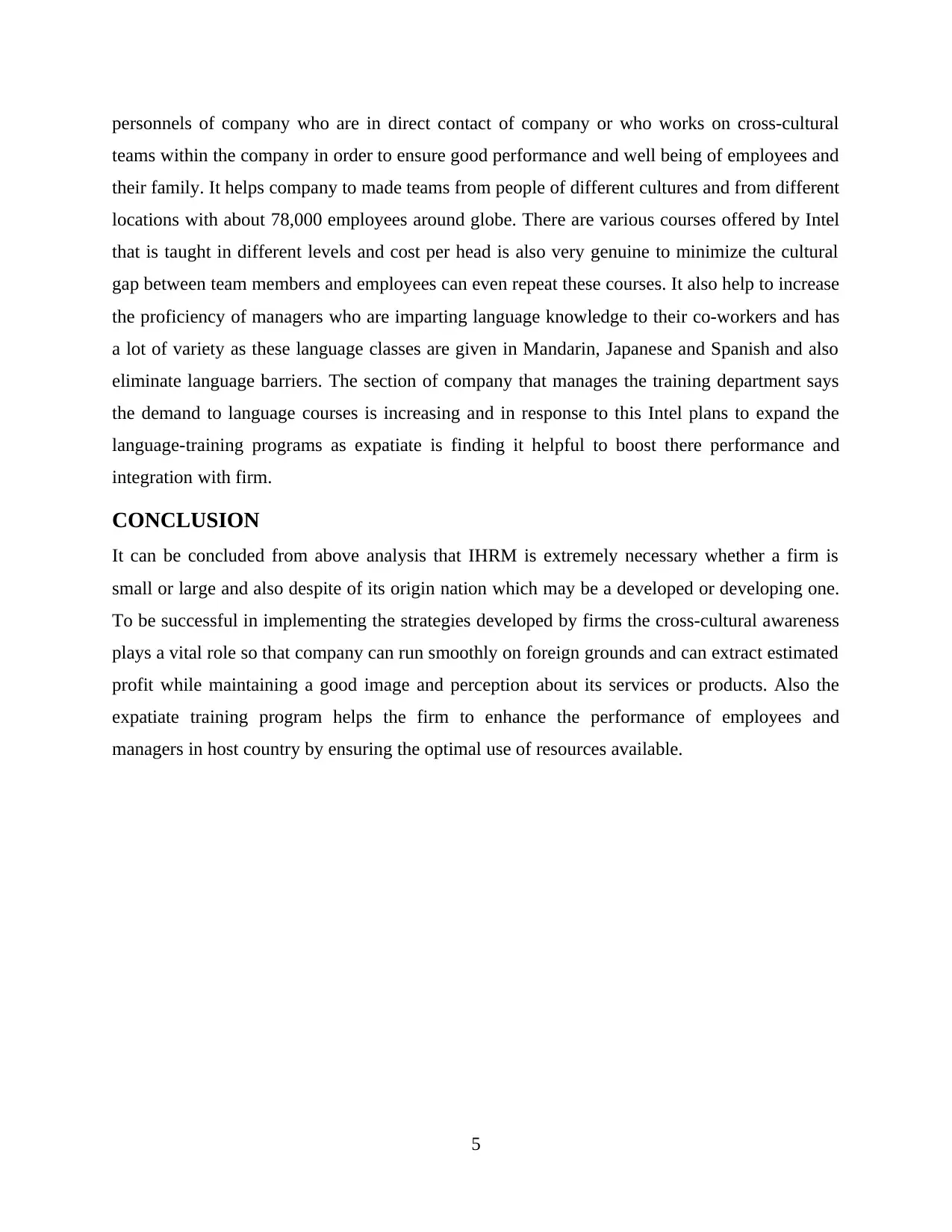
personnels of company who are in direct contact of company or who works on cross-cultural
teams within the company in order to ensure good performance and well being of employees and
their family. It helps company to made teams from people of different cultures and from different
locations with about 78,000 employees around globe. There are various courses offered by Intel
that is taught in different levels and cost per head is also very genuine to minimize the cultural
gap between team members and employees can even repeat these courses. It also help to increase
the proficiency of managers who are imparting language knowledge to their co-workers and has
a lot of variety as these language classes are given in Mandarin, Japanese and Spanish and also
eliminate language barriers. The section of company that manages the training department says
the demand to language courses is increasing and in response to this Intel plans to expand the
language-training programs as expatiate is finding it helpful to boost there performance and
integration with firm.
CONCLUSION
It can be concluded from above analysis that IHRM is extremely necessary whether a firm is
small or large and also despite of its origin nation which may be a developed or developing one.
To be successful in implementing the strategies developed by firms the cross-cultural awareness
plays a vital role so that company can run smoothly on foreign grounds and can extract estimated
profit while maintaining a good image and perception about its services or products. Also the
expatiate training program helps the firm to enhance the performance of employees and
managers in host country by ensuring the optimal use of resources available.
5
teams within the company in order to ensure good performance and well being of employees and
their family. It helps company to made teams from people of different cultures and from different
locations with about 78,000 employees around globe. There are various courses offered by Intel
that is taught in different levels and cost per head is also very genuine to minimize the cultural
gap between team members and employees can even repeat these courses. It also help to increase
the proficiency of managers who are imparting language knowledge to their co-workers and has
a lot of variety as these language classes are given in Mandarin, Japanese and Spanish and also
eliminate language barriers. The section of company that manages the training department says
the demand to language courses is increasing and in response to this Intel plans to expand the
language-training programs as expatiate is finding it helpful to boost there performance and
integration with firm.
CONCLUSION
It can be concluded from above analysis that IHRM is extremely necessary whether a firm is
small or large and also despite of its origin nation which may be a developed or developing one.
To be successful in implementing the strategies developed by firms the cross-cultural awareness
plays a vital role so that company can run smoothly on foreign grounds and can extract estimated
profit while maintaining a good image and perception about its services or products. Also the
expatiate training program helps the firm to enhance the performance of employees and
managers in host country by ensuring the optimal use of resources available.
5
Paraphrase This Document
Need a fresh take? Get an instant paraphrase of this document with our AI Paraphraser
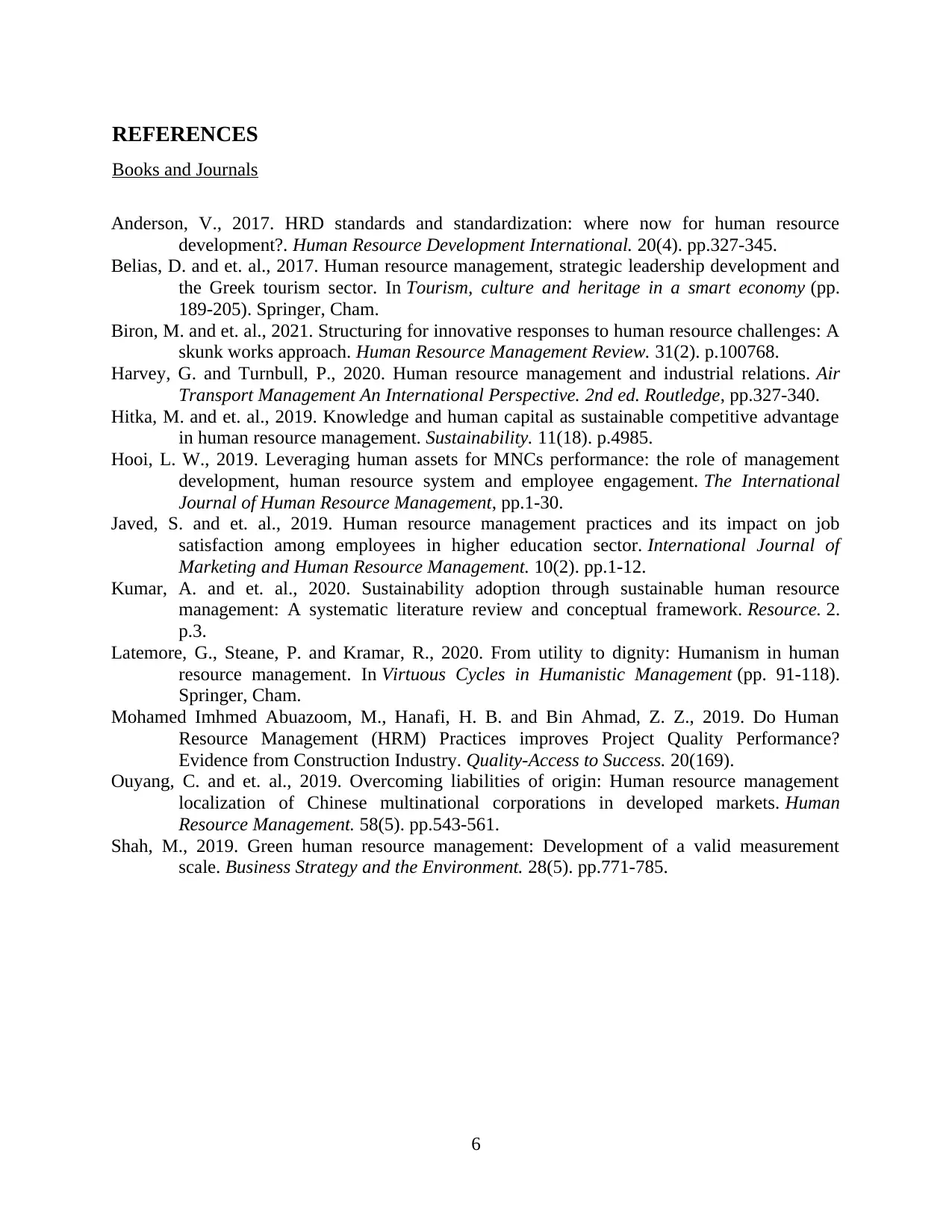
REFERENCES
Books and Journals
Anderson, V., 2017. HRD standards and standardization: where now for human resource
development?. Human Resource Development International. 20(4). pp.327-345.
Belias, D. and et. al., 2017. Human resource management, strategic leadership development and
the Greek tourism sector. In Tourism, culture and heritage in a smart economy (pp.
189-205). Springer, Cham.
Biron, M. and et. al., 2021. Structuring for innovative responses to human resource challenges: A
skunk works approach. Human Resource Management Review. 31(2). p.100768.
Harvey, G. and Turnbull, P., 2020. Human resource management and industrial relations. Air
Transport Management An International Perspective. 2nd ed. Routledge, pp.327-340.
Hitka, M. and et. al., 2019. Knowledge and human capital as sustainable competitive advantage
in human resource management. Sustainability. 11(18). p.4985.
Hooi, L. W., 2019. Leveraging human assets for MNCs performance: the role of management
development, human resource system and employee engagement. The International
Journal of Human Resource Management, pp.1-30.
Javed, S. and et. al., 2019. Human resource management practices and its impact on job
satisfaction among employees in higher education sector. International Journal of
Marketing and Human Resource Management. 10(2). pp.1-12.
Kumar, A. and et. al., 2020. Sustainability adoption through sustainable human resource
management: A systematic literature review and conceptual framework. Resource. 2.
p.3.
Latemore, G., Steane, P. and Kramar, R., 2020. From utility to dignity: Humanism in human
resource management. In Virtuous Cycles in Humanistic Management (pp. 91-118).
Springer, Cham.
Mohamed Imhmed Abuazoom, M., Hanafi, H. B. and Bin Ahmad, Z. Z., 2019. Do Human
Resource Management (HRM) Practices improves Project Quality Performance?
Evidence from Construction Industry. Quality-Access to Success. 20(169).
Ouyang, C. and et. al., 2019. Overcoming liabilities of origin: Human resource management
localization of Chinese multinational corporations in developed markets. Human
Resource Management. 58(5). pp.543-561.
Shah, M., 2019. Green human resource management: Development of a valid measurement
scale. Business Strategy and the Environment. 28(5). pp.771-785.
6
Books and Journals
Anderson, V., 2017. HRD standards and standardization: where now for human resource
development?. Human Resource Development International. 20(4). pp.327-345.
Belias, D. and et. al., 2017. Human resource management, strategic leadership development and
the Greek tourism sector. In Tourism, culture and heritage in a smart economy (pp.
189-205). Springer, Cham.
Biron, M. and et. al., 2021. Structuring for innovative responses to human resource challenges: A
skunk works approach. Human Resource Management Review. 31(2). p.100768.
Harvey, G. and Turnbull, P., 2020. Human resource management and industrial relations. Air
Transport Management An International Perspective. 2nd ed. Routledge, pp.327-340.
Hitka, M. and et. al., 2019. Knowledge and human capital as sustainable competitive advantage
in human resource management. Sustainability. 11(18). p.4985.
Hooi, L. W., 2019. Leveraging human assets for MNCs performance: the role of management
development, human resource system and employee engagement. The International
Journal of Human Resource Management, pp.1-30.
Javed, S. and et. al., 2019. Human resource management practices and its impact on job
satisfaction among employees in higher education sector. International Journal of
Marketing and Human Resource Management. 10(2). pp.1-12.
Kumar, A. and et. al., 2020. Sustainability adoption through sustainable human resource
management: A systematic literature review and conceptual framework. Resource. 2.
p.3.
Latemore, G., Steane, P. and Kramar, R., 2020. From utility to dignity: Humanism in human
resource management. In Virtuous Cycles in Humanistic Management (pp. 91-118).
Springer, Cham.
Mohamed Imhmed Abuazoom, M., Hanafi, H. B. and Bin Ahmad, Z. Z., 2019. Do Human
Resource Management (HRM) Practices improves Project Quality Performance?
Evidence from Construction Industry. Quality-Access to Success. 20(169).
Ouyang, C. and et. al., 2019. Overcoming liabilities of origin: Human resource management
localization of Chinese multinational corporations in developed markets. Human
Resource Management. 58(5). pp.543-561.
Shah, M., 2019. Green human resource management: Development of a valid measurement
scale. Business Strategy and the Environment. 28(5). pp.771-785.
6
1 out of 8
Related Documents
Your All-in-One AI-Powered Toolkit for Academic Success.
+13062052269
info@desklib.com
Available 24*7 on WhatsApp / Email
![[object Object]](/_next/static/media/star-bottom.7253800d.svg)
Unlock your academic potential
Copyright © 2020–2026 A2Z Services. All Rights Reserved. Developed and managed by ZUCOL.




